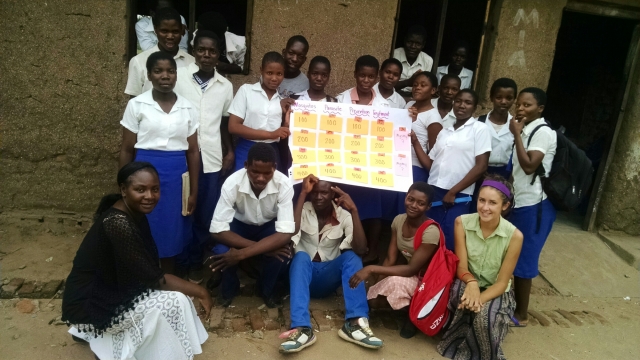”She had felt sorry for me even before she saw me. Her default position toward me, as an African, was a kind of patronizing, well-meaning pity… There was no possibility of feelings more complex than pity, no possibility of a connection as human equals.”
This is a quote from a TED Talk by Chimamanda Ngozi Adichie called “The Danger of A Single Story.” In this talk, Adichie discusses how we have the tendency to develop very myopic ideas about other cultures based on the news we watch, literature we read, and the stories we tell. For example, the single story that many people tell about Africa is that it is “…a place of beautiful landscapes, beautiful animals, and incomprehensible people, fighting senseless wars, dying of poverty and AIDS, unable to speak for themselves and waiting to be saved by a kind, white foreigner,” says Adichie.
In order to do my part in chipping away at Malawi’s single story and interjecting some complexities, here is an interview with Rosemary Mangochi. Mangochi is a Biology and Mathematics teacher at Khola Secondary School. She has a Bachelor’s of Science in Education and has been teaching for 23 years. I had the fortune of meeting her last year when I was looking for a teacher to help with Malaria Club and since then, she has become one of my closest friends in Kasinje.
Mrs. Mangochi (bottom left) and I pose with our Malaria Club members
Mrs. Mangochi, what was your childhood like?
“I grew up in Nsipe, Ntcheu with my parents and seven siblings. My father worked as the general manager of a wood company. My mother was a teacher at the local primary school. We were somewhat wealthier than the other families and lived on the outskirts of a larger town. When I reached Standard 5 [5th Grade], I was sent to a Catholic Boarding school five hours away. My mother said the best way to raise a girl is to take her from the home environment and confine her in a Catholic School.” Mangochi explains that after primary school, she went on to a private secondary boarding school in the capital of Lilongwe and then did her Bachelor’s degree in Mzuzu.
How did you decide to be a teacher?
“I think I took after my mother,” Mangochi reflects. “When I was in secondary school and the teacher was absent, I would get up in front of the class and start teaching my friends,” she comments, chuckling. “I remember admiring my agriculture teacher because she was always dressed so nicely, looking very smart. So I wanted to teach agriculture.”
Who inspired you to reach your goal of becoming a teacher?
“I used to live in Blantyre for part of my childhood. We lived on a street where high-ranking officials worked. So my siblings and I would watch them every morning going to work, and we admired that. At my secondary school, I also had a lot of female teachers who were very encouraging.” She pauses for a second and then adds with a smile, “And they were coming to school in cars.”
What kind of obstacles have you faced during your career or lifetime?
Mangochi starts by explaining a debilitating practice that is all too common for girls in Malawi. “When I was in Standard 2, [2nd grade] my mother told me to leave school so that I could take care of my brother. That means I had to repeat that year.” She continues reflecting on her childhood, “And when I started menstruating, there were no cotton wool, pads, or whatever. So we had to use rope tied around our hips with a piece of cloth tied to it between our legs. It would cut our sides and be so painful. We could not go to school during that time. We were forced to bathe in the river. That was too hard.” Mangochi goes on to explain the hardships that most Malawian women face here, not excluding herself. “Almost every chore is done by a girl or woman here. Even this house is in my hands,” she says from within the walls of a well built, brick home. “Every morning I wake up early to start a fire, sweep, bathe my children, make breakfast, iron my husband’s clothes, give him food, prepare my lessons. Even if you are educated, you’re entitled to every chore. It is a very big burden for women. They work all day long and sharing chores is impossible. If you try, they will say that you were not brought up well. This issue is everywhere. Girls are seen as inferior.”
What is your life like now?
“Now I am settled,” Mangochi replies, smiling and looking around her home, filled with nice furniture, a television, a stereo set with huge speakers, and decorations. “What I wanted most was to have a degree, and now I have one. I have to make sure my children finish their school. If I will have the means, maybe I can return to get a master’s degree.”
How are you unique from other Malawians?
“I’m very different. I’m unique. Not many girls or women engage themselves in studying science. But I did well in math and biology since Standard 1.” Mangochi continues to tell me how quickly she climbed the ranks during her career. At each school she has taught at, Mangochi has implemented extracurricular activities, something that most teachers fail to do. She has also been working to improve Khola Secondary since she arrived by generating funds to buy desks, sports uniforms, and eventually, bed nets. For many of her students, Mangochi is their favorite. “I like children. I try to engage them, to chat with them, to share food. Sometimes they come at night to tell me when someone is sick [in the boarding school].” Mangochi tells me that when planting season came, 15 of her students came to help plant, allowing her to finish an entire field in one day.
What is one thing about Malawians that you would want to explain to Americans?
“Malawians are hardworking. They have a lot of problems but they have their own way of persevering. We can handle it. We rely on one another so much.”
Thank you to Mrs. Mangochi for allowing me to interview her!
This post is part of Blogging Abroad’s 2017 New Years Blog Challenge, week two: The Danger of a Single Story.


What a wonderful role model you found in Mrs. Mangochi. She sounds like a very special woman who has overcome many challenges. Perhaps you can continue your friendship with her when you return to the states and contribute to her love teaching and sharing your culture with her students.
LikeLike